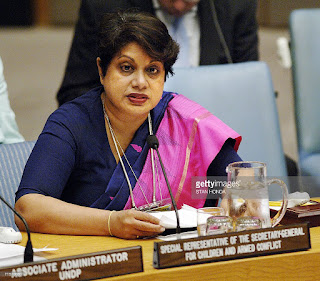A Brief Colonial History Of Ceylon(SriLanka)
Sri Lanka: One Island Two Nations
A Brief Colonial History Of Ceylon(SriLanka)
Sri Lanka: One Island Two Nations
(Full Story)
Search This Blog
Back to 500BC.
==========================
Thiranjala Weerasinghe sj.- One Island Two Nations
?????????????????????????????????????????????????Wednesday, June 29, 2016
Peacebuilding of the Future: The Challenges
Image courtesy Getty Images

DR. RADHIKA COOMARASWAMY on 06/28/2016
Hon. Chairperson
Hon. Secretary General
Your Excellences
Ladies and Gentlemen,
Hon. Secretary General
Your Excellences
Ladies and Gentlemen,
INTRODUCTION
Transitions are periods of potential danger in a nation’s history. They
are moments when we can move forward or moments where we may slip back
into cycles of perpetual violence. They are interregnums where we must
act with caution and wisdom. The nation state should take the lead but
the international community, especially the Peacebuilding Commission,
has an important role to play.
When the Department of Peace building asked me to give the keynote
speech here today, I realized that they were sending a signal, For the
most part of the last fifty years the United Nations, its agencies and
their departments have had their policies and programmed framed by the
wars in Africa- with Liberia and Sierra Leone being the ultimate
prototype. Today, there is a greater realization that the devastating
wars are now being fought in West Asia and in South Asia and until
recently in my own country Sri Lanka. The experience of these wars of
recent years, especially after 2001, must fundamentally challenge how we
look at war and therefore, how we look at peace building.
The most dramatic changes to take place since the great African wars of
the 1990s have been the technologies of war. Unmanned and manned
killing machines that can create extensive damage, acts of “terror” by
increasingly brutal non state actors, extensive surveillance through the
collection of meta data and personal attacks of human rights defenders
using the media and cyber attacks has increasingly characterizes modern
warfare in the new theatres of conflict. In addition new and porous
judicial doctrines like the theory of “human shields” to justify attacks
on civilian populations remain deeply problematic. Massive refugee
flows and the inevitable humanitarian consequences also remain an
important part of this scenario. Many of these conflicts are now in
Asia. However the United Nations from the Security Council to United
Nations departments remain wedded to the old ideas of war and therefore
to out of date ideas of peace building. It is important that the United
Nations, as an institution come to terms with the unfolding reality
around us and that we collectively respond to the crisis that many
countries face.
PARADIGM CREATION

